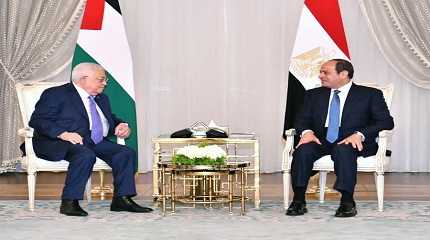
CAIRO, Aug. 2 (Xinhua) -- Intra-Palestinian reconciliation has to be achieved for reviving the Israeli-Palestinian peace process and realizing peace and security in the Middle East region, Egyptian analysts have said.
"Egypt is fully aware it will not be possible to relaunch the peace process in the Middle East amid the Palestinian division that has been ongoing for more than 15 years," Mostafa Amin, an Egyptian researcher on Arab and international affairs, told Xinhua.
Believing that failing to reach a just solution to the Palestinian issue would affect regional security, Egypt is leaving no stone unturned to help eliminate factors plunging the Palestinian-Israeli conflict into a cycle of violence with unimaginable consequences, according to Amin.
However, he said, reaching a fair and just solution to the conflict cannot be achieved unless the Palestinian national reconciliation is accomplished.
Chaired by Palestinian President Mahmoud Abbas, Palestinian factions met in Egypt on Sunday to discuss reconciliation efforts in an attempt to end their prolonged division since 2007 when the Islamic Resistance Movement (Hamas) violently took control of the Gaza Strip from the Fatah-led Palestinian Authority.
After the Egypt-hosted meeting, Abbas proposed forming a committee to complete the dialogue on issues discussed during the meeting in Egypt's New Alamein City.
Abbas also held discussions on the recent developments in the Palestinian cause and the intra-Palestinian division with his Egyptian counterpart Abdel-Fattah al-Sisi, who welcomed Palestinian factions' endeavors to restore national unity.
"Egypt believes that the continuation of the Palestinian division is a stumbling block to the establishment of a Palestinian state. The division also constitutes a pretext for Israel to ignore its legal obligations to end the occupation of Palestinian lands and to establish an independent Palestinian state," Amin added.
He noted that Israel is benefiting from the continued Palestinian division, adding that the Israeli side believes that the Palestinian political split is in the interest of Israel.
Egypt has repeatedly reiterated its position that supports the establishment of an independent Palestinian state based on the internationally-recognized two-state solution.
Egypt, which signed a peace treaty with Israel in 1979, has been sponsoring meetings between Palestinian factions for years, in addition to brokering truces between armed Palestinian movements and Israel.
Meanwhile, Abdel Mohdy Motawe, a Cairo-based researcher and executive director of the Middle East Forum for Strategic Studies and National Security, said Egypt's efforts to bring Palestinian rivals together are important at this very time as Israel is intensifying its practices and policies against the Palestinians in the Gaza Strip and the West Bank.
He revealed that the Palestinian factions, for the first time, announced their agreement and commitment that the Palestine Liberation Organization is the legitimate representative of the Palestinians, adding that they stressed the need for a unified national program to confront the plans of Israel's far-right government.
Motawe affirmed that real Arab and international efforts, along with those of Egypt, to end the division might make the national Palestinian reconciliation possible.
He said that countries working to resolve the Palestinian-Israeli conflict, such as Egypt and other Arab countries, China as well as Russia, need to work jointly to end the Palestinian division beforehand.
"The Palestinian factions also need to bridge their differences and respond positively to regional and international efforts aimed at achieving national Palestinian reconciliation, which will definitely be a window for an important international movement to push Israel to sit down at the negotiating table," Motawe told Xinhua.




